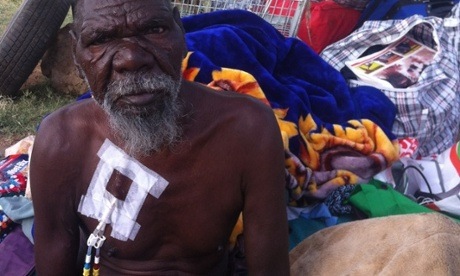
The Northern Territory government has put forward a proposal to use $10m from the commonwealth to improve accommodation services for Indigenous dialysis patients in central Australia, more than three years after it was offered.
Since the federal funding was first offered in 2011 to provide accommodation for dialysis patients from remote communities coming to Alice Springs and Tennant Creek, the Northern Territory government has repeatedly attempted to hand it back, despite services being stretched to the point that remote community patients are living on the street while they receive treatment, as was the case with Noel Charlie, reported last week by Guardian Australia.
However Wendy Southern, a deputy secretary within the Department of Health, told a Senate estimates hearing on Friday afternoon the department had received a proposal from the NT government “literally in the last couple of days”.
Southern’s answers came under questioning by Greens senator Rachel Siewert on “renewed rumours” the NT government was again attempting to return the funds to treasury.
Southern said there had been discussions between commonwealth and territory health department officials in the past year but it never came to a formal proposal.
“However in the last week we have seen a formal proposal from the NT government, which we are currently considering.”
Southern would not be drawn on the nature of the proposal, except to say that it was around “refurbishment of existing accommodation and housing for the purpose of providing housing support to patients and their families”.
A spokesman for the NT Department of Housing confirmed to Guardian Australia it was working in a proposal “to deliver a solution using the $10m in commonwealth funding.”
“The department is in discussions with the commonwealth and looks forward to providing additional capacity for housing renal patients and their family in Alice Springs and Tennant Creek,” he said in a statement.
A spokesperson for the assistant minister for health, Fiona Nash, told Guardian Australia the $10m “was never transferred to the NT government and remains with the commonwealth pending continuing discussions”.
Michael Gunner, the NT opposition spokesman for housing, told Guardian Australia he had not seen the formal proposal, but “my question would be is that refurbishment leading to extra beds? Or are there beds not being used?”
He added: “Refurbishing is good but Mr Charlie’s scenario shows we need the extra beds.”
Southern had earlier told estimates “the money is still available for the renal projects,” and it was just “an issue of how the money is delivered for the renal projects.” She said the money had not disappeared.
Siewert told Guardian Australia the dialysis service and support “crisis” in central Australia “has to be addressed urgently”.
“Accommodation for people coming into Alice Springs for dialysis continues to be a huge problem. Part of the solution for this problem is dialysis and support in the community,” she said in a statement. “We need to increase our capacity to provide these services in the bush.”
The Northern Territory government took no action for more than a year after the allocation of $13m to build accommodation facilities, the ABC reported in 2013, resulting in $3m being returned.
At the time of the report, the NT government said it did not have the additional funds required to run the facilities the federal government was offering to pay for.
In July that same year, the then NT health minister Robyn Lambley accused the federal government of being “absolutely inflexible”.
“They know that we don’t have the millions of dollars required to operate the facilities that they require us to operate,” she told ABC.
Last week Guardian Australia reported on an Aboriginal man in his 50s who had traveled to Alice Springs for dialysis had been living under a tree for more than a week after he was evicted from a federal government run hostel. Noel Charlie’s case is just one of many where a lack of funding has resulted in no safety net for the vulnerable group of people.
Gunner raised Charlie’s case during NT question time on Wednesday, asking specifically if priority public housing would be provided.
The health minister, John Elferink, accused Gunner of climbing “onto the self-righteous and moral high ground when it comes to these things” and of using question time to embarrass the government without doing anything about Charlie’s case himself.
Elferink then said he was unaware of Charlie’s issue but he was glad the Salvation Army had stepped in to give the man emergency shelter. Elferink took the question on notice.
